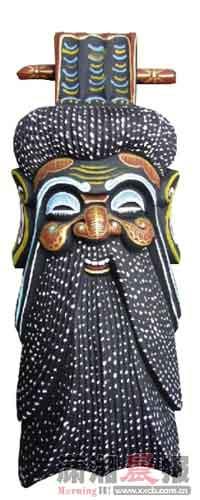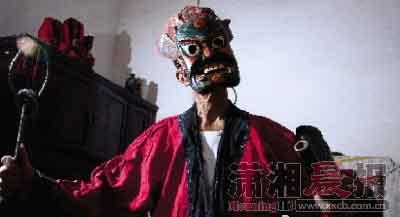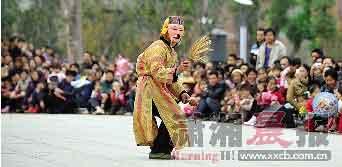
Masks of Nuo Opera: A Visual Journey

Image 1: Su Liwen, a folk "shaman" from the Nuo Opera troupe in Lengshuijiang, China. Photo by intern Gong Wei.

Image 2: A Nuo Opera artist performing live. Photo by Xie Zhengyu from the Photography Club.
Zhang Yimou's film "Riding Alone for Thousands of Miles" was inspired by Nuo Opera. It tells the story of a Japanese father who travels alone to China's Yunnan Province to film the Nuo Opera "Riding Alone for Thousands of Miles" for his terminally ill son. While the audience is moved by the father-son relationship, they are also captivated by a mysterious culture. The small, colorful masks on black cloth exude an ancient and eerie atmosphere. The masks are revered like deities...
Nuo Opera, originating in southern China, may or may not have roots in China's Hunan Province. However, in Loudi City, Nuo Opera has been preserved relatively intact.
In Longke Village, Yankou Town, Lengshuijiang City, Loudi, China, everyone from the elderly to young children knows Su Liwen. Led by villagers, the reporter met this 68-year-old man. Su, who started learning Nuo Opera at age six, is the 13th generation inheritor of Nuo Opera in his family. Recently, he was named an "Intangible Cultural Heritage Inheritor of China's Hunan Province."
[About Nuo Opera]
Nuo Opera, also known as Nuotang Opera or Duangong Opera, is a form of opera that evolved from folk rituals and incorporated elements of folk opera. It is widely popular in China's provinces of Anhui, Jiangxi, Hubei, Hunan, Sichuan, Guizhou, Shaanxi, and Hebei. Nuo Opera originated in ancient times, with shamanic songs and dances for both gods and humans existing as early as the pre-Qin period. In the late Ming and early Qing dynasties, as various local operas flourished, Nuo dance absorbed operatic forms and developed into Nuotang Opera and Duangong Opera.
After Nuo Opera took shape in western Hunan during the Kangxi period, it spread rapidly along the Yuan River into the Yangtze River, developing into different schools and artistic styles. The Nuotang Opera of China's Hunan and Hubei provinces absorbed the performance art of Huagu Opera. The Nuo Opera of China's Sichuan and Guizhou provinces incorporated elements from Huadeng art. The Nuo Opera of China's Jiangxi and Anhui provinces absorbed elements from Hui Opera and Mulian Opera.
Nuo Opera is a synthesis of history, folklore, folk religion, and primitive drama, containing rich cultural genes. It is called a living fossil for studying ancient Eastern body culture. Since the 1980s, many world-renowned universities, including Harvard, have been sending scholars to study it. Currently, there are thousands of artists in Loudi who understand Nuo Opera, and the government continues to search for more inheritors.
**When singing Nuo Opera, it's like becoming a different person**
Su Liwen is thin and dark, with wrinkles etched by time. At first glance, he looks no different from an ordinary village elder. He doesn't speak Mandarin, so our communication relies on writing. He's never been to school and knows nothing except the obscure "scripts" of Nuo Opera. When he starts singing Nuo Opera, with its strange words and peculiar tones, he seems to become a different person, his eyes shining with a captivating radiance.
"Those who sing Nuo Opera must be 'shamans' because Nuo Opera is for warding off evil and praying for blessings," Su Liwen emphasizes. "If someone in a family falls ill with a strange disease, singing a Nuo Opera sometimes cures it. I can't explain the reason behind it." In this area, he is still a highly respected figure. Especially in the second half of the year, he is called to "perform" for families in town almost every day. "In our area, we start 'worshipping the goddess' in the second half of the year, and Nuo Opera is an indispensable night program."
Nuo Opera has many folk legends, including invoking gods to cure diseases, bringing good fortune, opening the heavenly eye, and performing feats like climbing knife mountains and descending into seas of fire. For years, the mysterious aura surrounding Nuo Opera has never dissipated. Believers call it divine, while skeptics call it fake.
Li Xinwu, who has been researching Nuo Opera for many years, says that Nuo sacrificial activities have existed since the end of primitive society and were already very popular in Confucius's time. "It is said that Confucius was not good at social interactions, but whenever he encountered a village Nuo troupe passing by, he would respectfully stand at his door wearing silk clothes." For thousands of years, when people fell ill, they wouldn't seek medical treatment but would habitually invite "shamans" to perform Nuo Opera. There used to be a saying, "When ignorant people fall ill, they first call for a shaman, not a doctor." It is precisely because of this custom that Nuo Opera still has a broad mass base in rural areas.
**Climbing knife mountains and descending into seas of fire to gain villagers' trust**
Whether in Nuo sacrificial activities or Nuo Opera performances, masks are the most eye-catching props and are still imbued with mysterious religious meanings. Su Liwen told the reporter that in the Nuo Opera circle, masks are symbols and carriers of deities, and there are rules to follow when dealing with masks. For example, when making masks, a "consecration" ceremony must be held; when taking out masks, an "opening the box" ceremony is performed; when storing masks, a "sealing the box" ceremony is conducted. In the past, the making, using, and storing of masks were men's affairs, and women were not allowed to touch or wear masks. A man wearing a mask indicated that a deity had possessed him, and he couldn't speak or move casually, but now there are not so many requirements.
A man wearing a mask is also a shaman who performs Nuo Opera. A shaman starts learning at six or seven years old and can barely "debut" at twenty. Speaking of the process of learning Nuo Opera, Su Liwen talks enthusiastically. When he was six years old, his father, who was a "shaman," started teaching him the "scripts." As he grew older, his father began to orally transmit "secret language," which is never recorded in books and can only be passed down through generations. Then, the movements of Nuo Opera, singing styles, and the playing of gongs, drums, and props must all be mastered.
Before "debuting," every shaman must go through a strict "ritual" called "passing the altar" in Nuo culture. "Passing the altar means performing 'climbing knife mountains' and 'descending into seas of fire' in front of hundreds or thousands of villagers," Su Liwen explains. "Those knives are real butcher knives, every one of them sharp; that fire is a genuine roaring blaze. Only when a shaman can climb the knife mountain and descend into the sea of fire in front of everyone can he win the trust of the villagers, and only then will they invite him to perform rituals." "Even now, every shaman must pass this test."
**Took on dozens of apprentices, most of whom gave up halfway**
Su Liwen is proud of his skills. "In the past, if you wanted to learn Nuo Opera, you had to ask the master, ask heaven and earth, and divine in front of the ancestral teachers of heaven and earth. Only those who passed three divinations could enter the door, and they had to swear an oath when entering. Now it's not like that anymore. Forget about swearing, even if they did swear, it wouldn't matter. Young people don't remember and aren't afraid." Now, Su Liwen doesn't have so many ceremonies when taking on apprentices. He says, "For these 13 generations, Nuo Opera in my family has been passed down from father to son. Now times have changed, and we can't do that anymore. I started taking apprentices very early and have probably taught dozens of apprentices. Some succeeded, but most gave up halfway and went out to work for big money."
Fortunately, Su Liwen has two sons, Su Yezhao and Su Yelie, who have inherited his skills. "Now, I usually perform with my two sons. I'm old and can't sing much, so I just help with the gongs and drums. But the villagers trust me, and as long as I 'sit at the altar,' they feel at ease."
Throughout the interview, Su Yelie, the second son who accompanied his father, also revealed the bitterness of Nuo Opera to the reporter. "Times are different now. I went to school but couldn't find a job, so I came back to learn Nuo Opera. At first, I didn't dare to go out because everyone thought it was 'shameful' for young people to learn this." Now making a living from it, Su Yelie finally doesn't feel "ashamed" anymore, just too tired. "Nuo Opera is performed at night. Villagers usually go to bed at eight or nine in the evening, but we have to sing from dusk until midnight."
Su Yelie has two sons. The elder son, 20 years old, is studying at Jishou Normal University, and the younger son, 14 years old, is studying at Lengjiang Normal School. They haven't been exposed to Nuo Opera. "I don't want them to learn this; it's too hard. I had no choice, but I want them to study hard!" Su Yelie emphasizes repeatedly. When the reporter mentions the loss of Nuo Opera, he responds: Let my future grandsons learn it; my sons won't learn it anymore!
Source: China News Network - Rednet, August 13, 2011, 08:44
